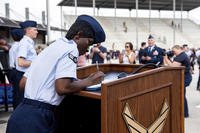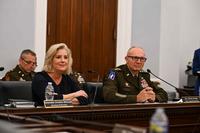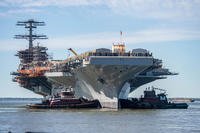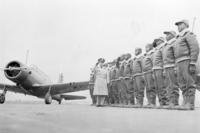Joseph V. Micallef is a best-selling military history and world affairs author, and keynote speaker. Follow him on Twitter at @JosephVMicallef.
Raqqa, the capital of the Islamic State, has fallen to the Syrian Democratic Forces (SDF), a mostly Syrian Kurd group consisting also of Arabs, Yazidis, Turkomen and Assyrian Christians, backed by airpower, advisers and armaments supplied by the United States.
The apocalyptic battle, complete with the appearance of messianic figures that had been predicted by ISIS propagandists, failed to materialize.
A few months earlier, Mosul -- the largest city held by ISIS -- had fallen to a combination of Iraqi military and security forces, Kurdish Peshmerga and the Iranian-backed Hash'd al Shaabi Shia militias (Popular Mobilization Forces or PMF).
Syrian military forces, with Russian support, have broken the siege of Deir ez-Zur and are engaging with ISIS forces around the city.
Iraqi forces have moved to besiege the last major ISIS strongholds in the districts of Al-Qa'im and Rawa along the Euphrates in Anbar province.
By any military standard, the Islamic State and its military forces are in a state of collapse. In the meantime, both Syrian Military Forces and the SDF are rushing to get control of ISIS-controlled oil fields in eastern Syria.
Is this the end of the Islamic State, or simply the beginning of the next chapter?
Regardless of what the future holds for ISIS, there is no escaping the reality that both Syria and Iraq are failed states. Destroying the Islamic State will not restore either country to its pre-ISIS state nor will it bring a return to a stable order. In fact, the opposite will be true.
In Syria, while it appears that with Russian support the Assad government will continue to be the titular head of the country, it is unlikely that Damascus will be able to exert authority over the entire country. Syria today is simply not the same state it was in 2012.
First, there is the matter of Rojava, the Syrian Kurdish state along the Turkish-Syrian border.
Ankara would like nothing more than to roll over the Syrian Kurds and end their incipient claim to autonomy, much less statehood. Militarily, the Turkish military would have little trouble doing this. This is a difficult region to defend, as it is primarily flat and lacks any obvious defensible geography.
The U.S. would be unhappy with such an outcome, but is unlikely to want to see a further deterioration of its relationship with the Erdogan government by actively opposing any Turkish attack.
Russia is a different matter. Notwithstanding Turkey's participation in NATO for almost 70 years, and its historic reliance on American security guarantees, Ankara seems less concerned about alienating the U.S. than it is about negotiating with Russia over the eventual outcome of the Syrian Civil War. Russia does not want to see a Turkish attack on Rojava -- at least not yet.
The continued presence of Rojava gives Russia useful leverage against both Erdogan and Assad, not to mention Baghdad and Tehran. The latter two have their own Kurdish problem and are sensitive to what happens with the Syrian Kurds.
The most likely outcome is that Moscow will broker a deal between the Kurds and the Assad government in which the Syrian Kurds are given some degree of autonomy and Rojava is recognized as a separate but federated state of Syria. The arrangement would be similar to the status of Iraqi Kurdistan.
The Syrian Kurds do not pose a fundamental threat to the Assad government. They are not looking to overthrow the Assad regime or fundamentally change Syria's governance, outside of their own objective of greater autonomy and perhaps eventual independence. The continued existence of the Kurdish state in Syria is more valuable to Russia than eliminating it is to the Assad government.
In addition, there is the de facto presence of Turkish troops in northern Syria and Turkish support for various Turkoman and Syrian Arab militias as well as the Free Syrian Army (FSA). Realistically, these groups do not have the ability to overthrow the Assad government without substantial help from either the U.S. or Turkey.
American help is unlikely, as Washington has pretty much washed its hands of these groups.
Turkey's position is more complicated. Ostensibly, the primary reason for the Turkish intervention was to support the various Sunni groups battling Assad and to pre-empt Syrian Kurds from linking up Rojava directly with the predominantly Kurdish-populated canton of Afrin.
The former task is a lost cause. The latter task has been accomplished. It is highly unlikely that the Kurds will seize control of the region between the west bank of the Euphrates and Afrin as long as Turkish troops are there.
Ankara, however, has stopped short of directly engaging Syrian military forces, although it has continued to aid various militia groups fighting the Assad government.
It stands to reason that there is an unspoken understanding between Ankara, Damascus and Moscow that any direct action against the Assad regime will bring more Russian support in favor of Syrian Kurds and their ambitions for Rojava. Moreover, an all-out war between Turkey and Syria would be highly unpopular in Turkey.
Forced to choose between eliminating Rojava or the Assad government, Ankara has made it clear where its priorities lie. While ideally it would like to get rid of both, Ankara is not prepared to pay the political price that a full-fledged Turkish invasion of Syria would require.
Secondly, Damascus will continue to have its hands full in dealing with the various Islamist groups active in Syria. While Syrian forces, backed by Russian airpower, will have a decisive advantage in engaging those groups, they are unlikely to ever completely defeat them.
The more likely outcome is that Damascus will nominally control the Sunni areas of Syria but find itself battling a long-term insurgency, much like the U.S. found itself battling in Iraq after 2004.
The reality is that a vast area of Syria, especially in the Sunni heartland of central and eastern Syria, has been destroyed by almost three years of relentless fighting. Much the same can be said of the former ISIS-controlled territory in western and northern Iraq. Virtually all the principal cities in the Sunni triangle of western Iraq -- Fallujah, Ramadi, Baiji, etc. -- have suffered extensive damage. So too has Mosul and its surrounding region.
The cost of Syrian reconstruction will be enormous. First, there are still tens of thousands of improvised explosive devices that have been deployed in the area. These will have to be cleared before any substantial reconstruction can begin.
Using Iraqi estimates as a guide, the cost of reconstruction will likely amount to between $25 billion and $50 billion. That's a guess; no one really knows for sure.
Moreover, continued insurgency in the region means that reconstruction will be disrupted and what rebuilding does take place is subject to ongoing damage from attacks.
There is no appetite in the U.S. or the European Union to fund any significant portion of this reconstruction effort. Bashar al-Assad is an anathema to Washington and Brussels, and no aid will be forthcoming if he stays in power. Russia lacks the financial wherewithal to contribute meaningfully to Syria's reconstruction.
Tehran also lacks the financial ability to contribute significantly to that reconstruction. Moreover, it has little incentive to fund the reconstruction of a region where it is unlikely to have any significant ongoing influence or support. In the meantime, continued Sunni unrest in Syria means that Assad will continue to be dependent on Russia and Iran to hold on to power.
The situation in Iraq is not much different. Russia and Iran will both be constrained in contributing to the reconstruction effort by the same factors as in Syria. Washington and Brussels have their own funding issues, and Iraqi reconstruction does not figure very prominently for either party.
Iraq is a major oil producer, and its production has been increasing. Still, despite rising production, it is already facing a $20 billion-plus budget deficit in 2017.
Baghdad simply doesn't have the money to fund a major reconstruction effort. In Mosul alone, the UN-Habitat Agency has estimated that around 10,000 homes have been destroyed, as well as large numbers of public buildings and infrastructure.
According to the Iraqi Fund for Reconstruction, the cost of rebuilding Mosul and its surrounding area will amount to $50 billion. Iraqi Minister of Planning, Abdul Zahra al-Hindawi, has estimated the cost of rebuilding all the areas affected by the war against Islamic State at around $100 billion over 10 years.
Some 80 percent of the Iraqi government's budget goes to pay salaries. Those patronage networks are a critical element of Prime Minister Haider al-Abadi's support and are the quid pro quo for ensuring continued support of his government and cooperation in parliament from the other Shia political parties.
Reducing such payments to fund the reconstruction of damaged Sunni areas of Iraq will prove to be politically difficult. Moreover, given the endemic corruption in both Iraq and Syria, it's likely that reconstruction costs will probably be much higher. That is yet another reason that will dampen any prospects of financial help from the U.S. or Europe.
It's possible that other Arab countries may be willing to fund some portion of the reconstruction effort. Saudi Arabia and its Gulf Cooperation Council allies have their own financial issues at the moment. Moreover, any substantial aid from Sunni governments in the south will likely come with a political agenda and may be contingent on more autonomy for the Sunni regions of Syria and Iraq.
The most likely scenario is that most of the former geography of the Islamic State, as well as some of the formerly rebel-held areas of Syria, will become a sort of ungovernable wild west. Neither Damascus nor Baghdad have the wherewithal to militarily occupy this region.
At best, the illusion of control will be maintained. Police and army units will be stationed there, but they will keep to their barracks and much of the region will become a no-go zone for government security forces and officials.
In short, an outcome very similar to the situation that prevailed before the U.S. surge and the organization of the Awakening Movement in 2005, or that prevailed before the collapse of Iraqi forces in June 2014.
Reconstruction will commence, but it is unlikely to do so at a meaningful pace. A region that was increasingly economically marginalized before the advent of Islamic State will find itself in even more dire economic straits and lacking much of the basic infrastructure, habitation and services that its inhabitants will demand.
The inability of Damascus and Baghdad to rectify the desolation that has been wreaked on many areas of Sunni Iraq and Syria may even succeed in rehabilitating, in part, the brutal tenure of Islamic State.
In this environment, jihadist groups, including ISIS, will find it easy to melt back into the civilian population and to return to the insurgency tactics they had adopted prior to the breakout of Islamic State in June 2014. In that case, one chapter in the war against ISIS will end and another one will begin.
There is one other possibility, Baghdad and Damascus may both opt to rely on the Iranian backed PMF militias to maintain order in the Sunni areas. To date, both governments have tried to keep those militias out of Sunni cities, except when no alternative was available, or they were under political pressure to allow their participation in the military effort against ISIS.
The presence of the Shia militias in Sunni areas has typically resulted in widespread reports of looting, vandalism and extrajudicial killings. In the short term, the deployment of these militias into Sunni areas may allow both governments to exert a greater degree of control, but at the price of exacerbating Shia-Sunni tensions, and in making the political situation much worse in the long-term.
The PMF itself is, like the Baghdad government, a shaky coalition comprised of Shia militias beholden to different political masters. The PMF has about 60,000 active fighters and it's believed could increase its strength by another 30,000, if it should want to do so, divided among 40 different core groups.
These groups range from the Abbas division, organized in response to a fatwa by the Grand Ayatollah Ali al-Sistani in June 2014, the Peace Brigades loyal to Iraqi cleric and political figure Moqtada al-Sadr, to the Badr Organization militias organized and funded by Iran and often led by officers from the Islamic Revolutionary Guard Corps. In addition, there are also smaller militias loyal to other Shia political factions.
The Baghdad government has introduced legislation to incorporate the PMF into the Iraqi military--a decision that will likely be problematic for the U.S. Many of the militia groups openly fought with U.S. forces when they were stationed in Iraq.
Access to Iraq's oil revenue has been one factor that has kept this uneasy coalition together. Any disruption in that largess could risk plunging the country into a sort of militia based "warlordism," in which different groups resort to violence to ensure their piece of Iraq's oil revenue.
The situation between Baghdad and the Kurdistan Regional Government (KRG) will also be a factor in the struggle with Islamic State. Iraqi military forces have moved to take back many of the areas seized by the Kurdish Peshmerga from ISIS, or which were taken over when they were abandoned by the Iraqi Army in June 2014.
The KRG has been backpaddling on its quest for Kurdish independence in light of its failure to obtain meaningful diplomatic support for its plans. Continued conflict between the KRG and Baghdad, even if it stops well short of an all-out war, will have a bearing on both the amount of funding ultimately available for reconstruction as well as Baghdad's options for securing and retaining control of predominantly Sunni areas.
Islamic State itself will adapt and change as a result of losing its associated geographic state. ISIS may return to the insurgency and subversive techniques it employed in the past but ISIS today is also a different organization than it was prior to 2014. For one thing it is now much more international. Despite its losses in Syria and Iraq, it continues to demonstrate the ability to finance and organize large scale operations from West Africa to the Philippines. Moreover, the return of thousands of ISIS trained jihadists to Europe has significantly expanded its terrorist playbook there.
Finally, while it has lost many of its lucrative sources of revenue, it now also has fewer financial obligations and it's developing other sources of funding from narcotics and other criminal activity. It's prestige and allure may have taken a hit from its battlefield losses and its apocalyptic predictions may have failed to materialize, but it still enjoys considerable appeal and support among jihadists and their supporters.
The demise of ISIS as a sovereign state may ultimately benefit other jihadist organizations like al-Qaeda. If so, then all that has been accomplished has been to trade one jihadist foe for another. Even so, the success of ISIS has caused other jihadist organizations to become more like them, to up their game, so to speak, when it comes to social media, propaganda and recruitment efforts.
This is evident from the increasingly sophisticated media efforts by al-Qaeda in the Arabian Peninsula. Even in defeat, the ISIS template, minus its more genocidal brutality, has been adopted by other jihadist organizations.
Either way, the war against the Islamic State is far from over. One chapter is ending. The next one is about to begin.
-- The opinions expressed in this op-ed are those of the author and do not necessarily reflect the views of Military.com. If you would like to submit your own commentary, please send your article to opinions@military.com for consideration.




























